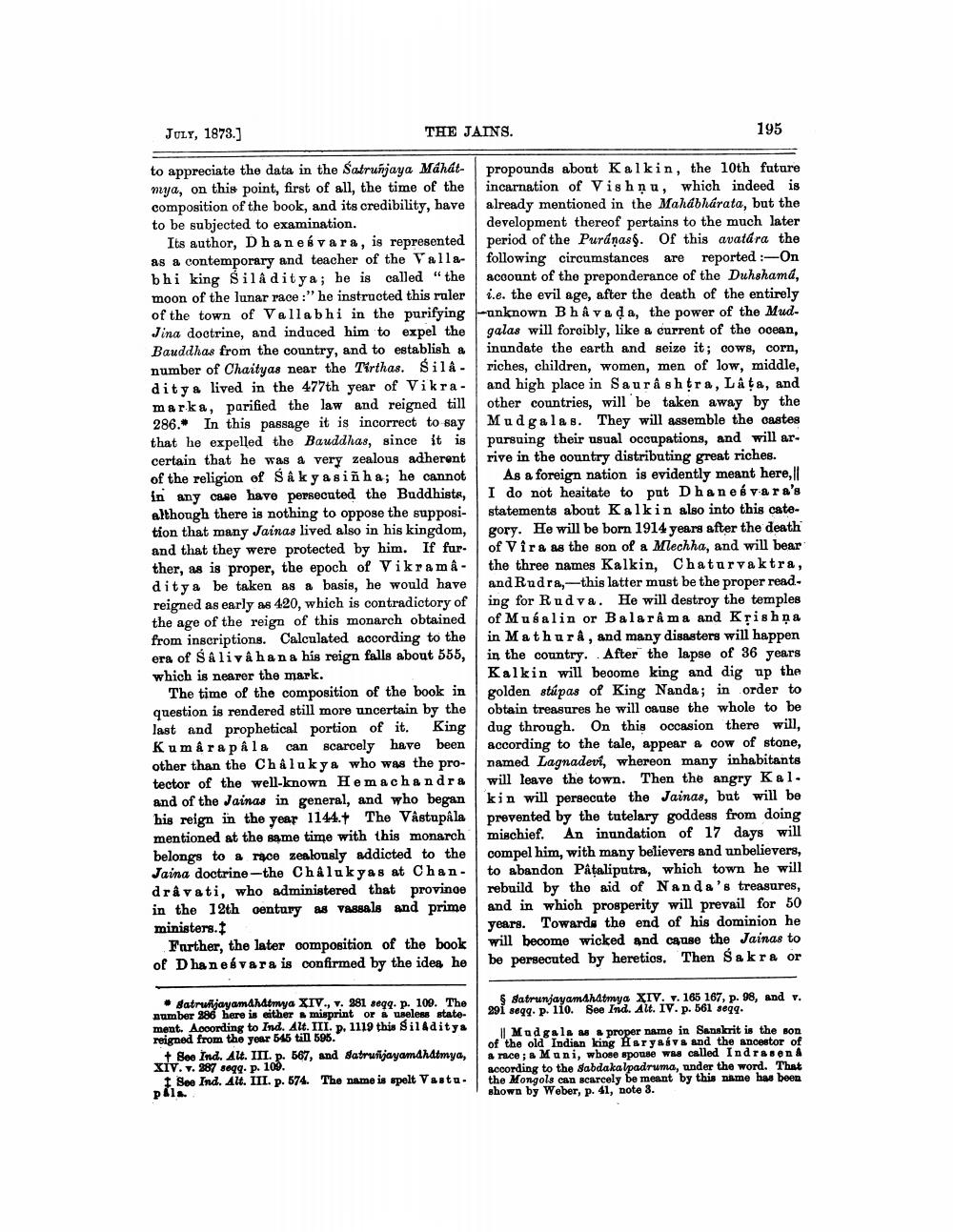________________
THE JAINS.
JULY, 1873.]
to appreciate the data in the Satrunjaya Máhátmya, on this point, first of all, the time of the composition of the book, and its credibility, have to be subjected to examination.
Its author, Dhanesvara, is represented as a contemporary and teacher of the Vallabhi king Silâditya; he is called "the moon of the lunar race :" he instructed this ruler of the town of Vallabhi in the purifying Jina doctrine, and induced him to expel the Bauddhas from the country, and to establish a number of Chaityas near the Tirthas. Siladitya lived in the 477th year of Vikramarka, parified the law and reigned till 286. In this passage it is incorrect to say that he expelled the Bauddhas, since it is certain that he was a very zealous adherent of the religion of Sakyasiñha; he cannot in any case have persecuted the Buddhists, although there is nothing to oppose the supposition that many Jainas lived also in his kingdom, and that they were protected by him. If further, as is proper, the epoch of Vikramâ- the three names Kalkin, Chaturvaktra, ditya be taken as a basis, he would have reigned as early as 420, which is contradictory of the age of the reign of this monarch obtained from inscriptions. Calculated according to the era of Saliva hana his reign falls about 555, which is nearer the mark.
The time of the composition of the book in question is rendered still more uncertain by the last and prophetical portion of it. King Kumarapala can scarcely have been other than the Chalukya who was the protector of the well-known Hemachandra and of the Jainas in general, and who began his reign in the year 1144. The Vâstupâla mentioned at the same time with this monarch belongs to a race zealously addicted to the Jaina doctrine-the Chalukyas at Chandravati, who administered that province in the 12th century as vassals and prime ministers.
Further, the later composition of the book of Dhanesvara is confirmed by the idea he
Batrunjayamahatmya XIV., v. 281 seqq. p. 109. The number 286 here is either a misprint or a useless statement. According to Ind. Alt. III. p. 1119 this Siladitya reigned from the year 545 till 595.
195
+ See Ind. Alt. III. p. 567, and Satruñjayamáhatmya, XIV. v. 287 seqq. p. 109.
See Ind. Alt. III. p. 574. The name is spelt Vastu.
pala.
propounds about Kalkin, the 10th future incarnation of Vishnu, which indeed is already mentioned in the Mahabharata, but the development thereof pertains to the much later period of the Puránas§. Of this avatára the following circumstances are reported :-On account of the preponderance of the Duhshama, i.e. the evil age, after the death of the entirely unknown Bhavada, the power of the Mudgalas will forcibly, like a current of the ocean, inundate the earth and seize it; cows, corn, riches, children, women, men of low, middle, and high place in Saurashtra, Lâța, and other countries, will be taken away by the Mudgalas. They will assemble the castes pursuing their usual occupations, and will arrive in the country distributing great riches.
As a foreign nation is evidently meant here,|| I do not hesitate to put Dhanesvara's statements about Kalkin also into this category. He will be born 1914 years after the death of Vira as the son of a Mlechha, and will bear
and Rudra, this latter must be the proper read. ing for Rudva. He will destroy the temples of Musalin or Balarama and Krishna in Mathura, and many disasters will happen in the country. After the lapse of 36 years Kalkin will become king and dig up the golden stúpas of King Nanda; in order to obtain treasures he will cause the whole to be dug through. On this occasion there will, according to the tale, appear a cow of stone, named Lagnadevi, whereon many inhabitants will leave the town. Then the angry Kal. kin will persecute the Jainas, but will be prevented by the tutelary goddess from doing mischief. An inundation of 17 days will compel him, with many believers and unbelievers, to abandon Pâțaliputra, which town he will rebuild by the aid of Nanda's treasures, and in which prosperity will prevail for 50 years. Towards the end of his dominion he will become wicked and cause the Jainas to be persecuted by heretics. Then Sakra or
§ Satrunjayamahatmya XIV. v. 165 167, p. 98, and v. 291 seqq. p. 110. See Ind. Alt. IV. p. 561 seqq.
Mudgala as a proper name in Sanskrit is the son of the old Indian king Haryaáva and the ancestor of a race; a Muni, whose spouse was called Indrasena according to the Sabdakalpadruma, under the word. That the Mongols can scarcely be meant by this name has been shown by Weber, p. 41, note 3.




